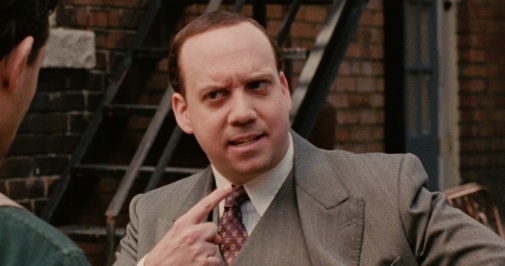
Sometimes, even the Academy thinks they messed up. That's how you get what I like to call "apology nominations," crucially different from "career nominations" because they come in response to one or more specific slights in the recent past. They are the honors that resound with an echoing sorry if you ring them just right, and there's no better example than Paul Giamatti's 2005 Best Supporting Actor nomination for Cinderella Man. After his shocking Sideways snub, one feels he would have been included for anything remotely Oscar-friendly.
It doesn't mean this reliable character actor didn't deserve it, of course, but there's a narrative quirk to how he got there, a faint sense that AMPAS was making up for a mistake. Now that Giamatti's back in the race with The Holdovers, it got me thinking about other cases of the phenomenon in the years since Cinderella Man…
Consider Angelina Jolie in 2008. Coming off a season when she was expected to be nominated for A Mighty Heart, the actress was in voters' minds when Clint Eastwood's Changeling came about, offering the Academy a chance to right a perceived wrong in near instantaneous fashion. Maggie Gyllenhaal's fate in 2009 is less obvious, though I'd argue her Crazy Heart Supporting Actress nomination depended upon a decade of stellar work regularly getting awards notices. It's a thankless part elevated by memories of Secretary and Sherrybaby, even Happy Endings to some extent.

As a supporting player in a well-reviewed Woody Allen film, Sally Hawkins was well-positioned to be nominated for Blue Jasmine, regardless of the Academy's remorse. However, it's hard to imagine her getting there without the groundswell of support that started in 2008 when she failed to secure a nod for her Golden Globe-winning turn in Happy-Go-Lucky. Similarly, Marion Cotillard was very close to a nomination in 2012 for Rust & Bone, making her 2014 Two Days, One Night shocker success more understandable. The quality of performance matters, but, in Oscar-land, narrative's essential too, and one would be naïve to suppose otherwise.
In 2016, two cases come to mind. There's Andrew Garfield, who'd been chasing that little golden man since The Social Network and had finally landed the "right" kind of vehicle with Hacksaw Ridge. One of the year's big surprises, Michael Shannon can also attribute part of his Nocturnal Animals recognition to the excellent press amassed with 99 Homes. Curiously enough, that 2016-7 season also planted the seeds of future apologies. Think about Amy Adams' easy sail to a Vice nod after her Arrival snub or how Denzel Washington rode the wave of a near-victory for Fences straight into an unexpected nomination for the underseen Roman J. Israel, Esq.

Yes, that last one brings about a different kind of "we're sorry" from AMPAS. It happens when someone's well-positioned to win but finishes in a likely, if not self-evident, second place. It happened with Washington, but one can follow a similar logic to Willem Dafoe's At Eternity's Gate nomination. After all, in 2017, he was the Best Supporting Actor frontrunner right until the televised awards threw the season in disarray. The Florida Project actor lost to Sam Rockwell, but the goodwill was still there, ready to flower into a fourth career nomination. Taking this logic to extremes, it's possible to argue that Jessica Chastain's win stemmed partly from a desire to make up for all those Almost Theres over the 2010s.
But of course, this is Oscar obsessive silliness, not meant to take credit away from the artists or even the voters. It's just a fun thought exercise you can continue in the comments. Sound off, dear reader - do you have more names and nominations to add to this lot?